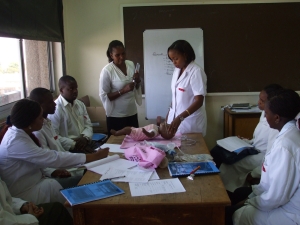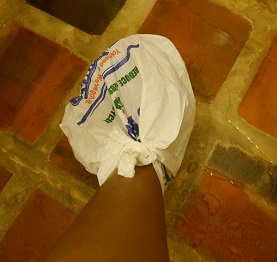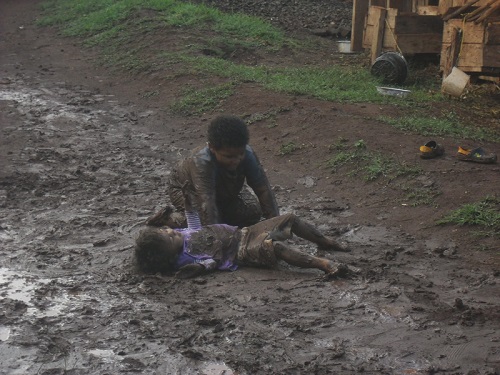Lessons that save lives
I interviewed Dr Grace Irimu while she was still a PhD student struggling to complete her thesis. I was very impressed with the work she was doing and she was one of the women that was featured in the ‘Women in science’ project in The East African ( http://www.theeastafrican.co.ke/magazine/-/434746/1377532/-/10dpfelz/-/index.html).
Here I present her larger story and work.
When Dr Grace Irimu agreed to collaborate on a program to develop guidelines for emergency care of seriously sick children, she had no idea how much it would change her life. Dr Irimu who was and still is a lecturer in paediatrics at the University of Nairobi medical school had just come home from the USA after a year of training in peadiatric nephrology. ‘I had been practicing nephrology at the Kenyatta Hospital but had begun to feel that the training I had was not having as big an impact as I wanted,’ Dr Irimu said explaining her desire to be involved in the project.
She heard of the research conducted by scientists at the KEMRI Wellcome trust led by Dr Mike English, in 13 District hospitals in Kenya in 2002. The team concluded that although the system of care is functioning, there were serious short-comings that lead to unnecessary deaths of young children. Problems noted included wrong dosages of common drugs like quinine for malaria and penicillin for pneumonia as well as inappropriate us of intravenous fluids for children dehydrated as a results of diarrhea. It was also noted that children were rarely seen by a doctor and almost never by a paediatrician at the point of admission. All health personnel interviewed expressed desire for further training suggesting that it was possible to improve performance through training interventions.
‘By engaging in developing guidelines for treating children admitted to hospital with serious illness, I felt I would reach more children early enough to stop their illness complicating and this was more likely to lead to a reduction in death rates as compared to focusing on nephrology,’ Dr Irimu said.
So Dr Mike English, a scientist from the KEMRI-Wellcome Trust and Dr Grace Irimu, along with experts from the Ministry of Health, university teaching hospitals and respected paediatricians from the country developed the clinical practice guidelines. A 5 day program for dissemination of the guidelines was developed. This training was dubbed ETAT+ which stands for Emergency Triage Assessment and Treatment plus admission care. The group put together the evidence which they presented to experts from a wider group with some coming from Uganda and Tanzania. The group debated the evidence presented at a ‘Child health week’. Within the Ministry of health, the final version of the guidelines was reviewed, endorsed and approved for publication as ‘Ministry of Health Basic Peadiatric Protocols’.
Under the guidance of Dr Mike English, Dr Irimu and colleagues set off on a research project to test how effective ETAT+ training would be in 8 Kenyan hospitals.
Sometimes research can seem very removed from the reality on the ground and sometimes it can be so applicable that people cannot wait for the results in order to implement change. This is what happened when ETAT + was first introduced to a few Kenyan hospitals as a research project. Staff at the Ministry of health demanded for the training to be extended to more of them. ‘We did not have enough trainers. The capacity at that point was low but we had to answer the need,’ Dr Irimu said. At that time only seven people were trained but they took ETAT+ to all provincial hospitals in the country.
Dr Irimu introduced ETAT+ to students pursuing postgraduate training in paediatrics who made such an impact that the course was made mandatory for all future students. The lecturers at the medical school also wanted the training and when they were done, they agreed that ETAT+ would be a mandatory, examinable course for undergraduates at the University of Nairobi medical school from 2008.
The success of ETAT+ training took Dr Irimu and the team by surprise but they are grateful for the support they got throughout the process from all the stakeholders. ‘It is not often that research goes through such a smooth and quick ride into practice. It is the first time such a course has been introduced into the undergraduate medical school as a ‘block’ rather than staggered. It was not easy but the faculty was very supportive,’ says Dr Irimu. ‘Once you have something like this in pre-service training, then you know that it is sustainable and ETAT+ is sustainable now,’ Dr Irimu says. Training within the hospital setting is likely to be sustainable. ‘We have enough trainers. We keep the cost low by ensuring that the trainings are held on site, no posh hotels and no per diems. The lack of per diems also ensures that only those who will use the course attend it, giving maximum impact,’ Dr Irimu says.
The results of the training are already being felt. Dehydrated kids with superficial blood vessels so collapsed that a line is hard to find, are now walking home, thanks to ETAT+ training that has taught health personnel to give the life-saving fluid through the bone. ‘In the past, a doctor would spend hours trying to fix a line at which point even if the child survives, the brain will be severely damaged due to lack of perfusion,’ Dr Irimu said. Underweight babies are surviving in hospitals where the record for survival was low. But to Dr Irimu, the most significant change is the attitude of the health professionals. ‘Clinicians don’t just see individual children during ward rounds but they are interested in what is happening on the ward. They see their patients more often. They take a detailed history of patient’s condition,’ Dr Irimu said.
The private sector was not left behind. Dr Thomas Ngwiri who currently heads the clinical services at Gertrude’s hospital was among that initial group of 7 that developed the ETAT+ guidelines. When he left the public sector, he initiated ETAT+ training at his new station, the Gertrude’s children hospital. ‘People had already heard about ETAT+, the challenge was to put it together and get it on the ground,’ said Dr Ngwiri. ETAT+ success in the public sector helped its smooth entry into private practice. Gertrude’s children hospital now regularly hosts ETAT + training for staff from both private and public hospitals.
Will more of this type of training be introduced in medical school? Dr Ngwiri says ‘Yes, but it will happen slowly, partly because evidence-based practice is new in our universities.’ But Dr Ngwiri believes that data generated locally will dilute the skepticism present when evidence based practice is build from data generated from outside the country. Gertrude’s children hospital has 300,000 outpatients and about 8,000 inpatients a year. Information generated from mining this data could inform practice and agitate for change.
‘When doctors leave medical school, they should have it inculcated in them to self-read and look up medical journals to find out what the latest information is,’ Dr Irimu said. She is saddened that doctors do not convert knowledge to practice because they are unaware of the knowledge available. ‘ETAT+ has shown us that our knowledge needs to be updated so the next step is to spread this to the other fields and change professionalism,’ Dr Irimu concludes. Dr Irimu recently completed her PhD. For her research project, she sought to understand the factors that influence uptake of evidence-based practices in the health care system. She is optimistic that the knowledge generated through this study will help in the delivery of quality care for sick children.
One of the more urgent MDG’s is to reduce mortality of children under 5 years old by two-thirds of the 1990 level by 2015. A third of all children die in hospital. About 80% of all children admitted in hospitals suffer from five common illnesses (which are addressed in ETAT+), that lead to most deaths.
ETAT+ training shows that focusing energy on tackling the child as a whole instead of investing in vertical programs that treat each disease separately has a higher impact at less cost. The enthusiasm of experts like Dr Grace Irimu and Dr Thomas Ngwiri will go a long way in ensuring the survival of children in Kenya.





